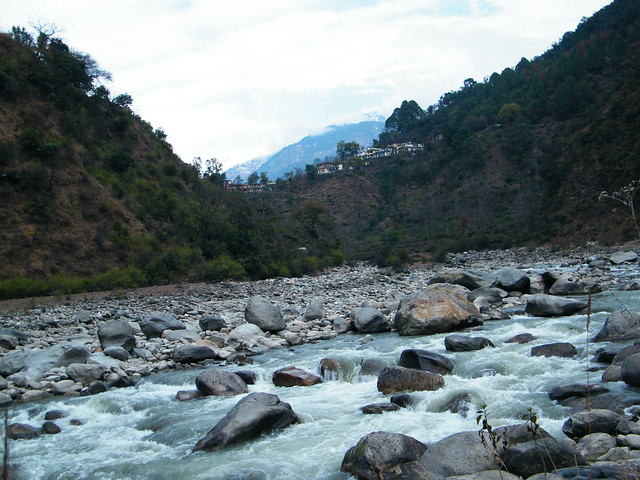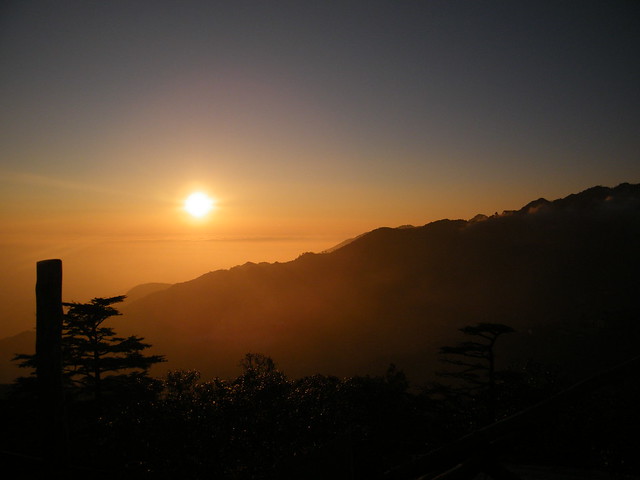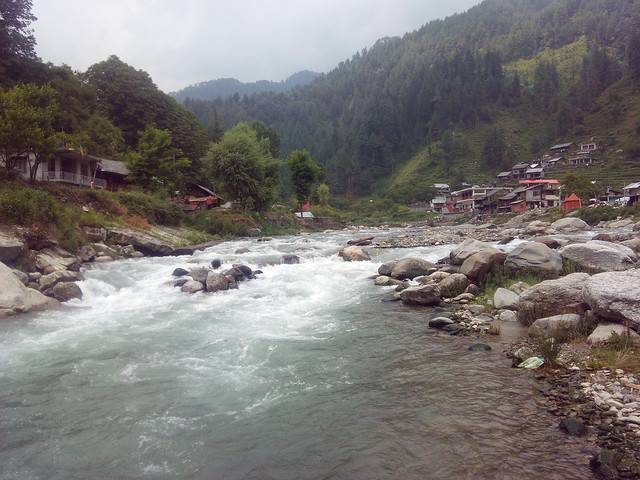नदिया चले, चले रे धारा
हर बार हिमालय की गोद में आकर कल-कल बहते हुए पानी को देखकर वैसे तो बहुत कुछ सीखने को मिलता है, लेकिन ऐसा कुछ है जो कि मन में बस सा गया है। अगर आपने कानपुर और वाराणसी में गंगा के पानी को देखा होगा तो आपको जरूर हृषिकेश में गंगाजल की याद आई होगी, जहाँ पर आप नदी का तल देख सकते हैं, पानी इतना स्वच्छ है। थोड़ा आगे जाकर आपने दूर से देवप्रयाग में भागीरथी और मन्दाकिनी के संगम को भी देखा होगा, जहाँ एक मटमैली धारा एक हरे रंग की धारा के साथ मिलती है। देहरादून जाते समय पथरीली घाटी भी दिखाई दी होगी, जो वैसे तो पूरे साल सूखी रहती है लेकिन बरसात में रौद्र रूप धारण कर लेती है। कसोल में पार्वती नदी को देखकर बस एक ही चीज मन में आती है कि नदी के उस पार तैरकर जाना संभव भी है क्या। और देवरिया ताल में छोटी सी झील को देखकर महाभारत काल में चले जाना स्वाभाविक है क्योंकि मान्यताओं के अनुसार इसी झील के किनारे यक्ष ने युधिष्ठिर से प्रश्न किये थे।
ये हिमालय से निकलने वाली धाराएं कोई सामान्य धाराएं नहीं हैं और जैसा कि मैंने पहले भी ‘नदी बहती रही’ में कहा है कि मनुष्य के जीवन और नदी के बहाव में अत्यधिक समानताएं हैं। जैसे मनुष्य अपने बाल्यकाल में शरारती स्वाभाव का होता है जिसे संसार के किसी भी दुःख दर्द की परवाह नहीं होती है और जिसका दिन खेलते कूदते हुए ही बीत जाता है उसी प्रकार नदी भी कंकरीली पथरीली भूमि पर बहते हुए उछलती कूदती हुई चली जाती है। जब मनुष्य परिपक्व हो जाता है उसके स्वभाव में एक गंभीरता आ जाती है, उसके निर्णयों में एक सोच समझ झलकती है उसी प्रकार नदी भी जब मैदानी भागों में प्रवेश करती है तो उसकी गति मंद पड़ जाती है मानों उसे जिम्मेदारियों के बोझ तले दबा दिया गया हो। जब मनुष्य वृद्धावस्था में प्रवेश करता है तो उसकी शक्ति क्षीण हो जाती है और ब्रह्मलीन होने के पहले उसका मन कई दिशाओं में भटकता रहता है। ठीक उसी प्रकार नदी भी सागर के पास पहुँचते पहुँचते बहुत धीमी हो जाती है, बीच में कई टापू उभर आते है और कई शाखाओं में बँट जाती है।
मनुष्य का जीवन हमेशा एक रूप में ही थोड़े ही रहा है। कभी तेज तो कभी धीमा। कभी प्रखर तो कभी समझौतावादी। कभी प्रयत्नशील तो कभी भाग्यवादी। कहीं जीत तो कहीं हार। कभी झुकना तो कभी फिर उठना। वैसे ही पानी को भी कई बार रूपांतरण करना पड़ा है। कभी बर्फ बनकर पहाड़ों पर थम गया तो कभी झरना बनकर बार बार पत्थर के विवेक पर चोट की है। कभी खेतों को सींचने के लिए थम गया तो कभी पहाड़ों को हिला देने वाली गति से चल उठा। कभी बाँध बनाकर इसे रोक दिया गया तो कभी भूस्खलन में पूरे पहाड़ आकर इसके कलेजे में धंस गये। कभी भगवान शंकर की जटा में बैठ गया तो कभी आंसू बनकर लोगों की भावनाओं की अभिव्यक्ति का साधन बना। और रैदास ने तो कहा भी है कि ‘तुम चन्दन हम पानी’ जिसमें उन्होंने पानी को सब कुछ आत्मसात करने वाला बता दिया है।
तो जब हरिद्वार में हर की पौड़ी में चण्डी देवी को निहारते हुए गंगा किनारे बैठकर सोचता हूँ कि इस बार इस आत्म मंथन से क्या लेकर जाऊंगा तो मैं सोचता हूँ कि जिंदगी में इतने अनगिनत पड़ाव आते हैं कभी सुख तो कभी दुःख झेलना पड़ता है। संसार में कितनी ही असफल जिंदगियाँ हैं, कितने ही दुर्गम रास्ते हैं और कितने ही अक्षम्य अपराध मनुष्य ने किये हैं जिसके कारण उसे हारकर बैठना पड़ता है। कितनी ही बार मनुष्य अनुत्तरीय प्रश्नों के आगे निरुत्तर रह गया है और बस अपने भाग्य को कोस कर रह गया है। कई बार क्या पाया है सोचने की बजाय क्या खोया ज्यादा सोचने लगता है। तो ऐसे में मैं फिर अविरल धारा की ओर आशा भरी नज़रों से देखता हूँ कि शायद यहाँ कोई जवाब मिल जाये।
और नदी की धारा ने मुझे यहाँ भी निराश नहीं किया। कितनी बार नदी की धारा को बाँध बनाकर मंद किया गया। अलग अलग धारायें निकालकर उसको क्षत-विक्षत किया गया। उसके किनारे मानव बस्तियाँ बसाकर उसको गन्दगी ढोने का एक साधन बना दिया गया। पूजा के नाम पर कितने फूलों पत्तियों को तोड़कर उसमें समाहित कर दिया गया। और तो और वर्षा की अति होने पर उसे हानि के लिए कोसा भी गया। मैंने पूँछा नदी से कि इतनी विपरीत परिस्थितियों के बाद कभी ऐसा नहीं लगता कि जीवन जिया ही क्यों जाये। नदी की एक छोटी सी धारा मेरे पैरों के पास रुकी और कहा कि कुछ भी घटित हो, आशातीत या आशानुरूप, जीवन निर्बाध रूप से चलता रहता है। इतना कहकर वह धारा फिर अपनी राह पर चल पड़ी।
 |
| नदिया चले, चले रे धारा । तुझको चलना होगा । |









